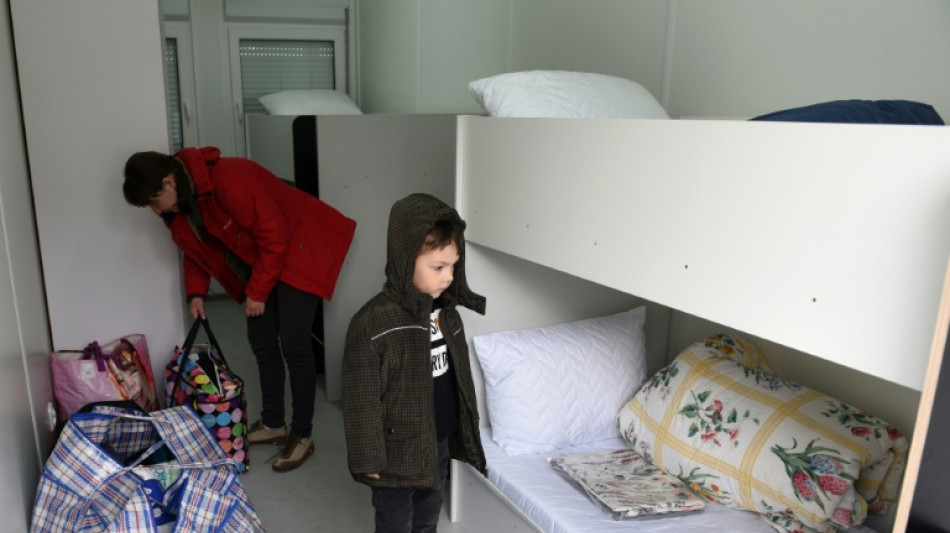
-
 US vetoes Gaza ceasefire call at UN
US vetoes Gaza ceasefire call at UN
-
US Fed official warns against cutting rates 'too quickly'

-
 Archbishop of Canterbury to end official duties on January 6
Archbishop of Canterbury to end official duties on January 6
-
Barcelona push back Camp Nou return to mid-February

-
 US cites new Russian tactics for decision to supply landmines to Ukraine
US cites new Russian tactics for decision to supply landmines to Ukraine
-
Under-fire Spain minister defends agencies' role in floods

-
 Trump names loyalist Matthew Whitaker as NATO ambassador
Trump names loyalist Matthew Whitaker as NATO ambassador
-
Iconic Real Madrid lockers on display in London auction

-
 Johnson & Johnson risks UK lawsuit over talc cancer claim
Johnson & Johnson risks UK lawsuit over talc cancer claim
-
UN watchdog chief welcomes Iran nuclear gesture as Western powers seek censure

-
 Germany power past Canada to reach Davis Cup semis
Germany power past Canada to reach Davis Cup semis
-
Arnault family to complete Paris FC acquisition "in coming days"

-
 Hezbollah says Israel 'cannot impose conditions' for truce
Hezbollah says Israel 'cannot impose conditions' for truce
-
Rich nations pressed to put money on table at UN climate talks
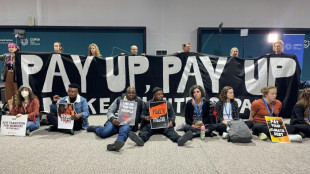
-
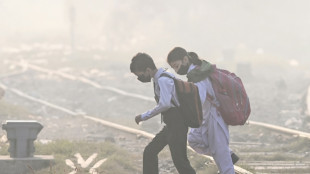 Pakistan reopens Punjab schools after smog improves
Pakistan reopens Punjab schools after smog improves
-
All Black fly-half Plummer to join French side Clermont

-
 Stock markets retreat ahead of Nvidia earnings
Stock markets retreat ahead of Nvidia earnings
-
Ford to cut 4,000 jobs in Europe

-
 As Trump returns, China seizes chance for climate mantle
As Trump returns, China seizes chance for climate mantle
-
Spurs appeal against length of Bentancur ban for Son slur

-
 French comedian faces victims of drug-fuelled car crash
French comedian faces victims of drug-fuelled car crash
-
Focus purely on Springboks, not future, insists under-fire Wales coach Gatland

-
 Ukraine criticises Western allies for embassy closures
Ukraine criticises Western allies for embassy closures
-
One Direction stars attend Liam Payne's funeral in UK
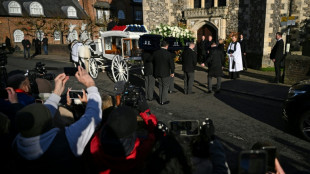
-
 French farmers lift border blockade after talks with PM
French farmers lift border blockade after talks with PM
-
US envoy heading to Israel to press for truce with Hezbollah

-
 Uganda opposition figure Besigye appears in military court
Uganda opposition figure Besigye appears in military court
-
General strike in Greece against cost of living

-
 UN nuclear chief welcomes Iran's 'concrete step' on uranium stockpile
UN nuclear chief welcomes Iran's 'concrete step' on uranium stockpile
-
Floods to shave 0.2 percentage points off Spain's growth

-
 Argentina's Contepomi makes one change for France Test
Argentina's Contepomi makes one change for France Test
-
'Steep climb' ahead as clock ticks on stalled climate talks
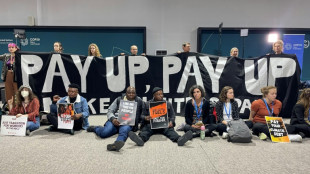
-
 Gatland changes four for Wales clash with South Africa
Gatland changes four for Wales clash with South Africa
-
'Sport will have the last word' as WRC title goes down to the wire in Japan

-
 Western powers move to censure Iran at UN nuclear meet
Western powers move to censure Iran at UN nuclear meet
-
US envoy presses Israel-Hezbollah truce bid in Lebanon visit

-
 'No controversy' around Alldritt exclusion for Argentina Test
'No controversy' around Alldritt exclusion for Argentina Test
-
Stock markets gain, dollar higher before Nvidia earnings

-
 New WHO financing mechanism put to the test
New WHO financing mechanism put to the test
-
Besigye kidnapping: Uganda president's doctor turned rival

-
 Star K-pop producer of NewJeans quits after legal spat with BTS agency
Star K-pop producer of NewJeans quits after legal spat with BTS agency
-
'Eternal' Nadal leaves legacy as he retires from tennis

-
 Vieira takes over at struggling Gerona
Vieira takes over at struggling Gerona
-
Australia's Kerevi banned for Morgan tackle

-
 Bellamy defies 'lunatic' reputation to inspire Wales revival
Bellamy defies 'lunatic' reputation to inspire Wales revival
-
Kremlin says US 'doing everything' to prolong 'war' in Ukraine

-
 Magritte painting nets auction record of $121 million
Magritte painting nets auction record of $121 million
-
Markets fluctuate as traders weigh geopolitical tensions

-
 N. Korea's latest weapon? Bombarding South with noise
N. Korea's latest weapon? Bombarding South with noise
-
'Kidnapped' Uganda opposition figure Besigye to appear at military court: lawyer

| RIO | 0.03% | 62.45 | $ | |
| CMSC | -0.18% | 24.52 | $ | |
| BTI | 0.05% | 36.95 | $ | |
| SCS | -0.38% | 13.04 | $ | |
| BCC | -0.33% | 137.729 | $ | |
| NGG | -0.69% | 63.145 | $ | |
| CMSD | -0.24% | 24.285 | $ | |
| BCE | -0.63% | 27.14 | $ | |
| RYCEF | -1.98% | 6.56 | $ | |
| GSK | -0.5% | 33.295 | $ | |
| JRI | -0.24% | 13.228 | $ | |
| RBGPF | -0.91% | 59.65 | $ | |
| BP | -0.59% | 28.92 | $ | |
| AZN | -0.69% | 63.36 | $ | |
| VOD | 0.2% | 8.938 | $ | |
| RELX | -0.89% | 44.89 | $ |

Displaced Ukrainians move into room of their own in the park
In a park in western Ukraine, Viktoria wheeled her four-month-old granddaughter in a pushchair between rows of prefabricated houses that have become home after escaping war.
The 39-year-old kindergarten administrator, her daughter and granddaughter arrived last month in the city of Lviv, escaping bombardment in the eastern region of Lugansk.
The previous day they moved into the temporary village set up off one of the park's main walkways, after spending three weeks living in a school.
"The conditions were good there but there were 18 people sleeping on the floor in the room with us," she said.
"Here we can be just by ourselves, we have real beds, and it's warm," she added, of their new home built with funding from neighbouring Poland.
Russia's invasion of Ukraine in late February has killed thousands and forced millions to flee their homes.
Some 200,000 internally displaced people have found shelter in Lviv, a city with a pre-war population of around 700,000 that has remained relatively safe compared to the rest of the country, despite deadly missile strikes on Monday.
Polish Prime Minister Mateusz Morawiecki made a flash visit to the new settlement for the displaced in Lviv on Tuesday, saying it could welcome up to 350 people.
"There will be more of these villages. In Lviv alone, they will accommodate 5,000 people," he promised a gaggle of mostly Polish reporters and a few garden landscapers.
Plans were also afoot to build similar settlements in ravaged towns retaken from the Russians outside the capital Kyiv, he added.
After the premier left, 12-year-old Dmitry arrived with his mother, little brother and uncle, lugging a few carrier bags, to move in too.
"I like it here," said the young boy from the eastern city of Kramatorsk standing in his new doorway, two bunk beds visible behind him.
His uncle Oleksandr, a factory worker, said the family had left everything behind when they fled in mid-March.
"We hope that the war ends soon, so we can go home and return to work," he said.
- 'New friends' -
In the courtyard, a family walked in from a nearby polytechnic building-turned-shelter, appearing to look for a private room of their own.
A short walk away, across from an open-air coffee shop, around 400 people still slept inside the polytechnic's sports centre.
In one of its warmly heated rooms, beds covered in blankets stretched out across an indoor basketball court. Clean clothes hung up to dry on stall bars under a basketball hoop.
Olena, 75, said she had fled the city of Kharkiv near the Russian border, where her newly furnished flat had been destroyed.
The unmarried teacher trainer said she hoped the war would stop soon so she could return home.
But "I'm fine here, I've made new friends. We're one big, close-knit family," she said, dressed in a dark green cardigan and matching woolly hat.
A few days ago, she said, she and a new male friend from her home city took one of Lviv's trolleybuses and went to mass together.
Outside in the park, a couple of large pigeons pecked at the pathway between the trees, while a red squirrel bounced along the undergrowth.
Volodymyr, a 53-year-old from Lviv, walked up the path carrying a plastic tricycle, followed by his grandson, two-year-old Lukyan.
"We come here every day. I like the squirrels, and he likes the pigeons," he said, showing off two round walnuts in his coat pocket.
He said it was a small mercy that the park had remained the same despite the war.
"A few old trees have been cut down, but the squirrels are still here running around," he said.
G.P.Martin--AT
